Detailed Analysis of ASIC v Soust [2010] FCA 68 in Corporation Law
VerifiedAdded on 2021/05/30
|9
|2408
|340
Report
AI Summary
This report provides a comprehensive analysis of the Corporation Law case, ASIC v Soust [2010] FCA 68. It begins with an introduction to the significance of corporate law in Australia and the role of the Corporations Act 2001. The report then presents the facts of the case, focusing on the actions of Dr. Martin Soust, the CEO of Select Vaccines Limited, and his alleged breaches of director duties. The discussion section delves into the specific duties breached by Dr. Soust, including acting in good faith, misuse of position, and making misleading statements, referencing relevant sections of the Corporations Act. The court's decision is analyzed, highlighting the legal principles applied and the implications of the ruling. The impact of the decision on corporate activities and the role of ASIC is also discussed, emphasizing the importance of director accountability and the interpretation of key provisions of the Act. The report concludes by summarizing the key findings and the significance of the case in shaping corporate governance in Australia.
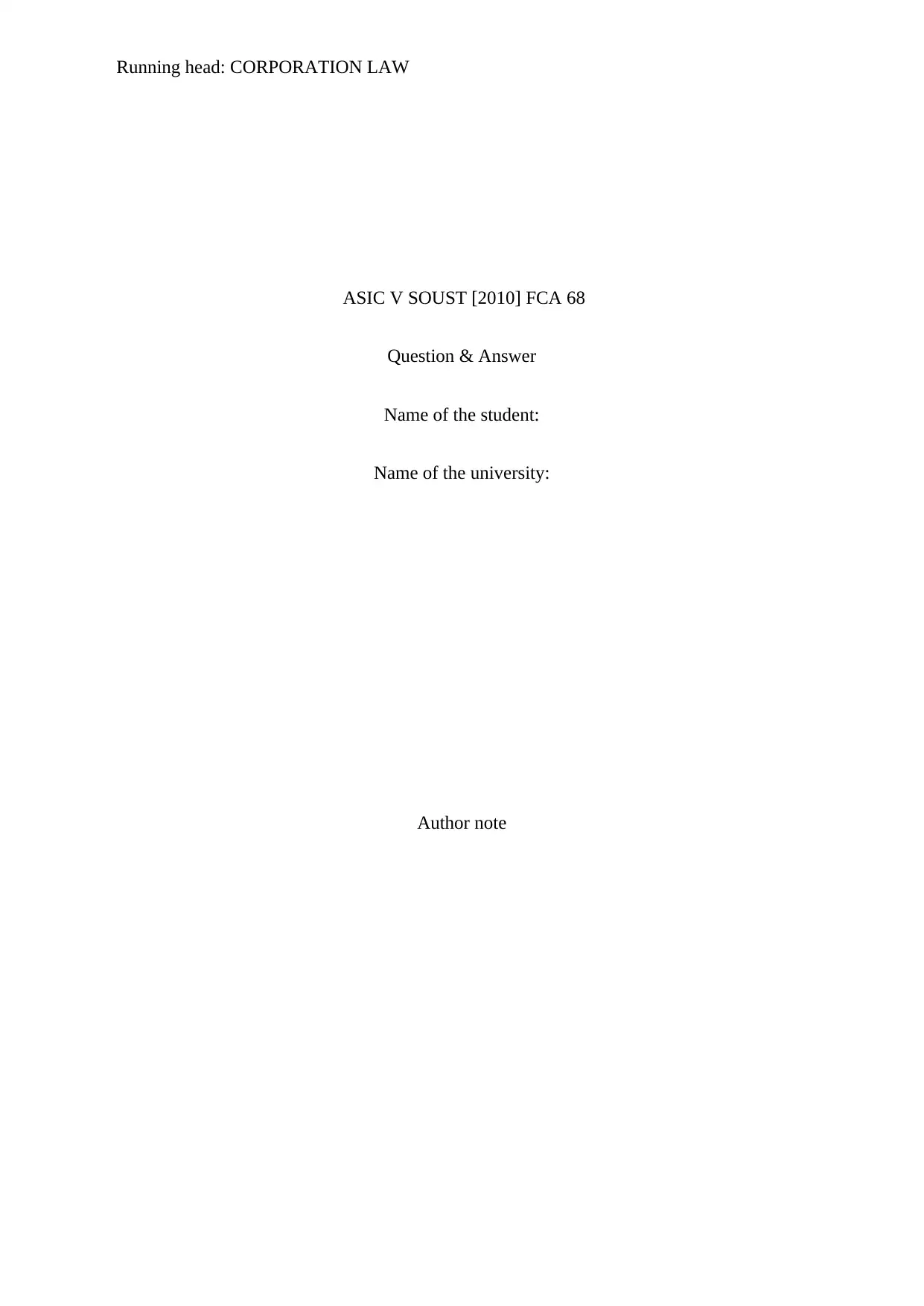
Running head: CORPORATION LAW
ASIC V SOUST [2010] FCA 68
Question & Answer
Name of the student:
Name of the university:
Author note
ASIC V SOUST [2010] FCA 68
Question & Answer
Name of the student:
Name of the university:
Author note
Paraphrase This Document
Need a fresh take? Get an instant paraphrase of this document with our AI Paraphraser
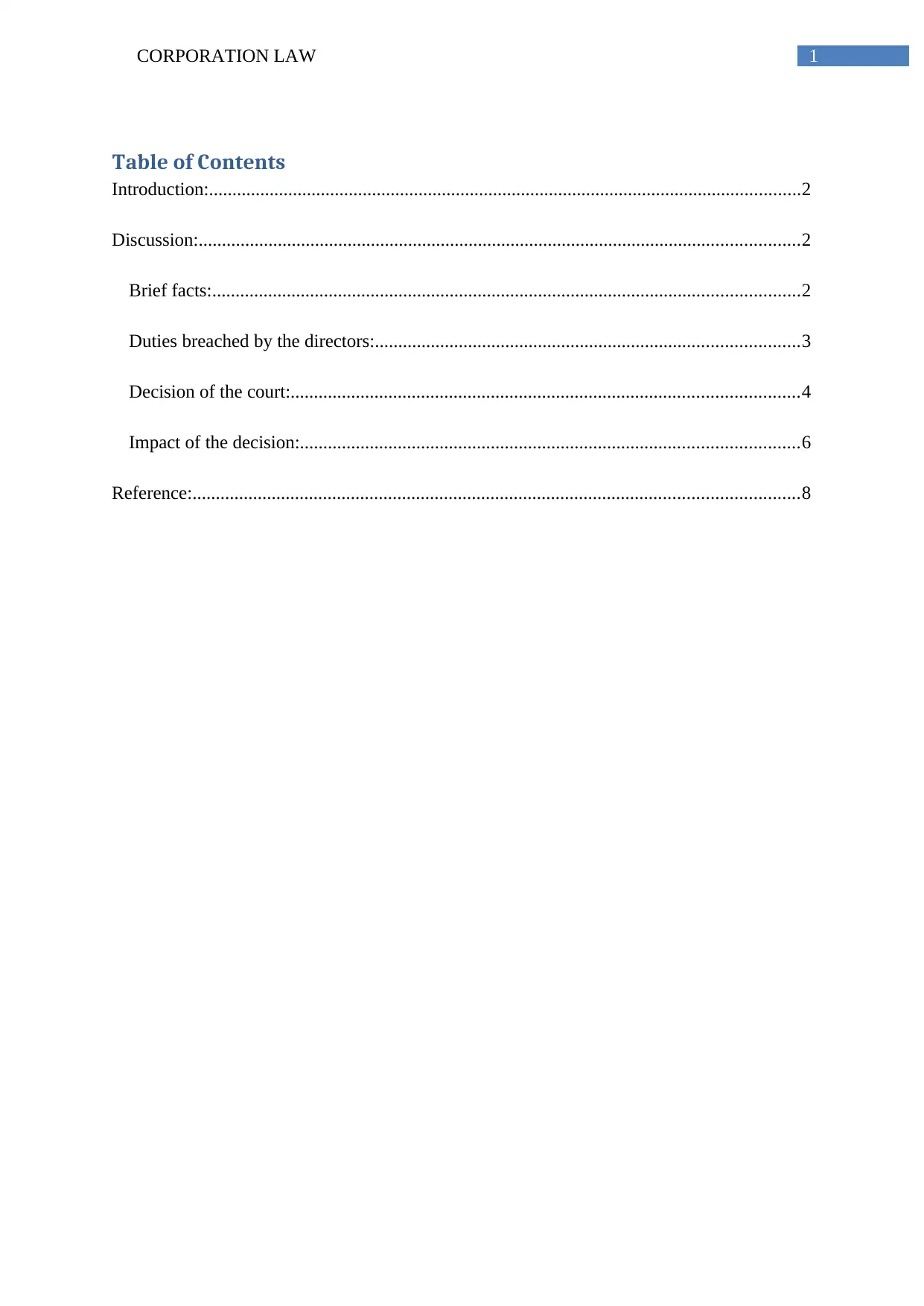
1CORPORATION LAW
Table of Contents
Introduction:...............................................................................................................................2
Discussion:.................................................................................................................................2
Brief facts:..............................................................................................................................2
Duties breached by the directors:...........................................................................................3
Decision of the court:.............................................................................................................4
Impact of the decision:...........................................................................................................6
Reference:..................................................................................................................................8
Table of Contents
Introduction:...............................................................................................................................2
Discussion:.................................................................................................................................2
Brief facts:..............................................................................................................................2
Duties breached by the directors:...........................................................................................3
Decision of the court:.............................................................................................................4
Impact of the decision:...........................................................................................................6
Reference:..................................................................................................................................8
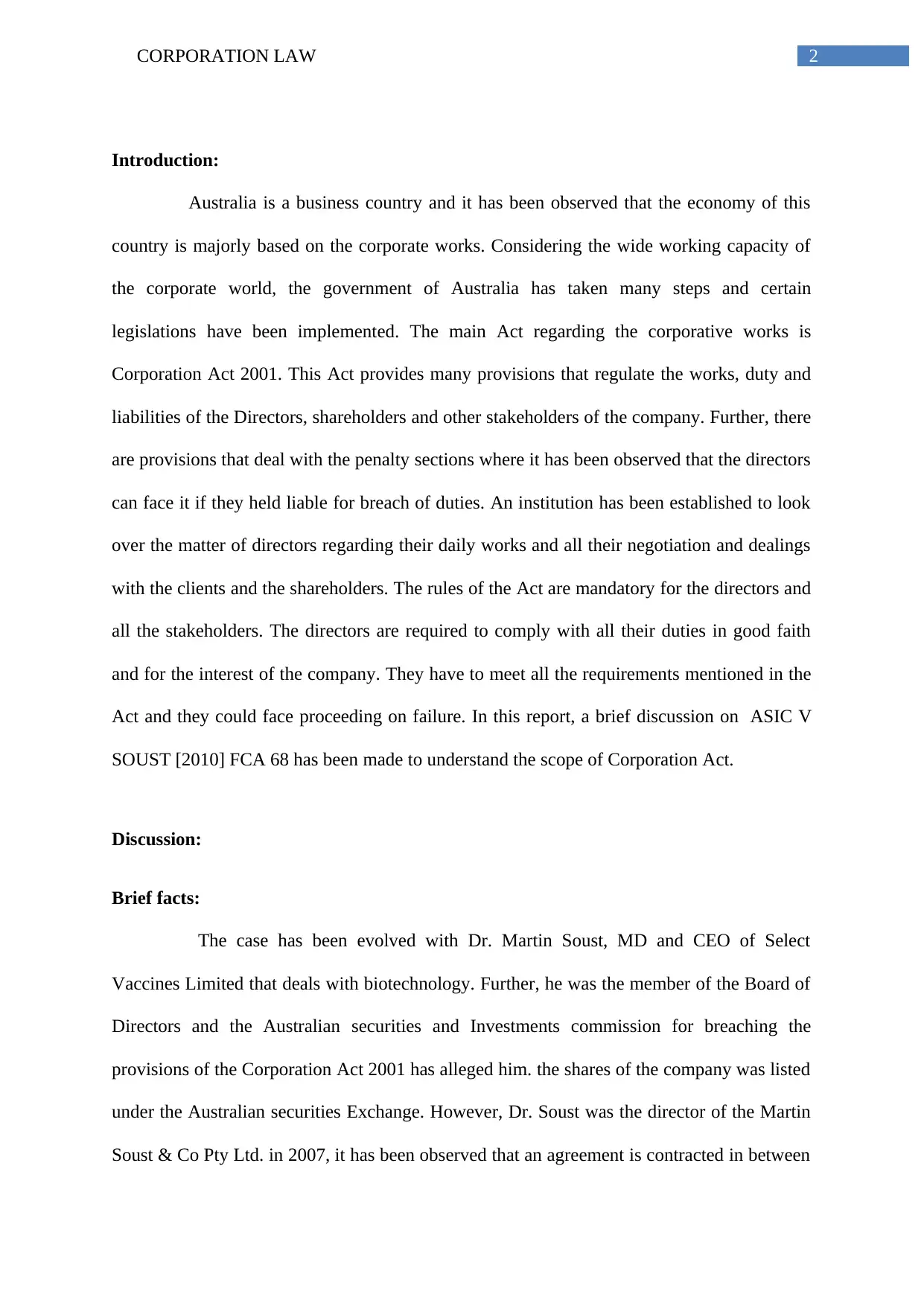
2CORPORATION LAW
Introduction:
Australia is a business country and it has been observed that the economy of this
country is majorly based on the corporate works. Considering the wide working capacity of
the corporate world, the government of Australia has taken many steps and certain
legislations have been implemented. The main Act regarding the corporative works is
Corporation Act 2001. This Act provides many provisions that regulate the works, duty and
liabilities of the Directors, shareholders and other stakeholders of the company. Further, there
are provisions that deal with the penalty sections where it has been observed that the directors
can face it if they held liable for breach of duties. An institution has been established to look
over the matter of directors regarding their daily works and all their negotiation and dealings
with the clients and the shareholders. The rules of the Act are mandatory for the directors and
all the stakeholders. The directors are required to comply with all their duties in good faith
and for the interest of the company. They have to meet all the requirements mentioned in the
Act and they could face proceeding on failure. In this report, a brief discussion on ASIC V
SOUST [2010] FCA 68 has been made to understand the scope of Corporation Act.
Discussion:
Brief facts:
The case has been evolved with Dr. Martin Soust, MD and CEO of Select
Vaccines Limited that deals with biotechnology. Further, he was the member of the Board of
Directors and the Australian securities and Investments commission for breaching the
provisions of the Corporation Act 2001 has alleged him. the shares of the company was listed
under the Australian securities Exchange. However, Dr. Soust was the director of the Martin
Soust & Co Pty Ltd. in 2007, it has been observed that an agreement is contracted in between
Introduction:
Australia is a business country and it has been observed that the economy of this
country is majorly based on the corporate works. Considering the wide working capacity of
the corporate world, the government of Australia has taken many steps and certain
legislations have been implemented. The main Act regarding the corporative works is
Corporation Act 2001. This Act provides many provisions that regulate the works, duty and
liabilities of the Directors, shareholders and other stakeholders of the company. Further, there
are provisions that deal with the penalty sections where it has been observed that the directors
can face it if they held liable for breach of duties. An institution has been established to look
over the matter of directors regarding their daily works and all their negotiation and dealings
with the clients and the shareholders. The rules of the Act are mandatory for the directors and
all the stakeholders. The directors are required to comply with all their duties in good faith
and for the interest of the company. They have to meet all the requirements mentioned in the
Act and they could face proceeding on failure. In this report, a brief discussion on ASIC V
SOUST [2010] FCA 68 has been made to understand the scope of Corporation Act.
Discussion:
Brief facts:
The case has been evolved with Dr. Martin Soust, MD and CEO of Select
Vaccines Limited that deals with biotechnology. Further, he was the member of the Board of
Directors and the Australian securities and Investments commission for breaching the
provisions of the Corporation Act 2001 has alleged him. the shares of the company was listed
under the Australian securities Exchange. However, Dr. Soust was the director of the Martin
Soust & Co Pty Ltd. in 2007, it has been observed that an agreement is contracted in between
⊘ This is a preview!⊘
Do you want full access?
Subscribe today to unlock all pages.

Trusted by 1+ million students worldwide
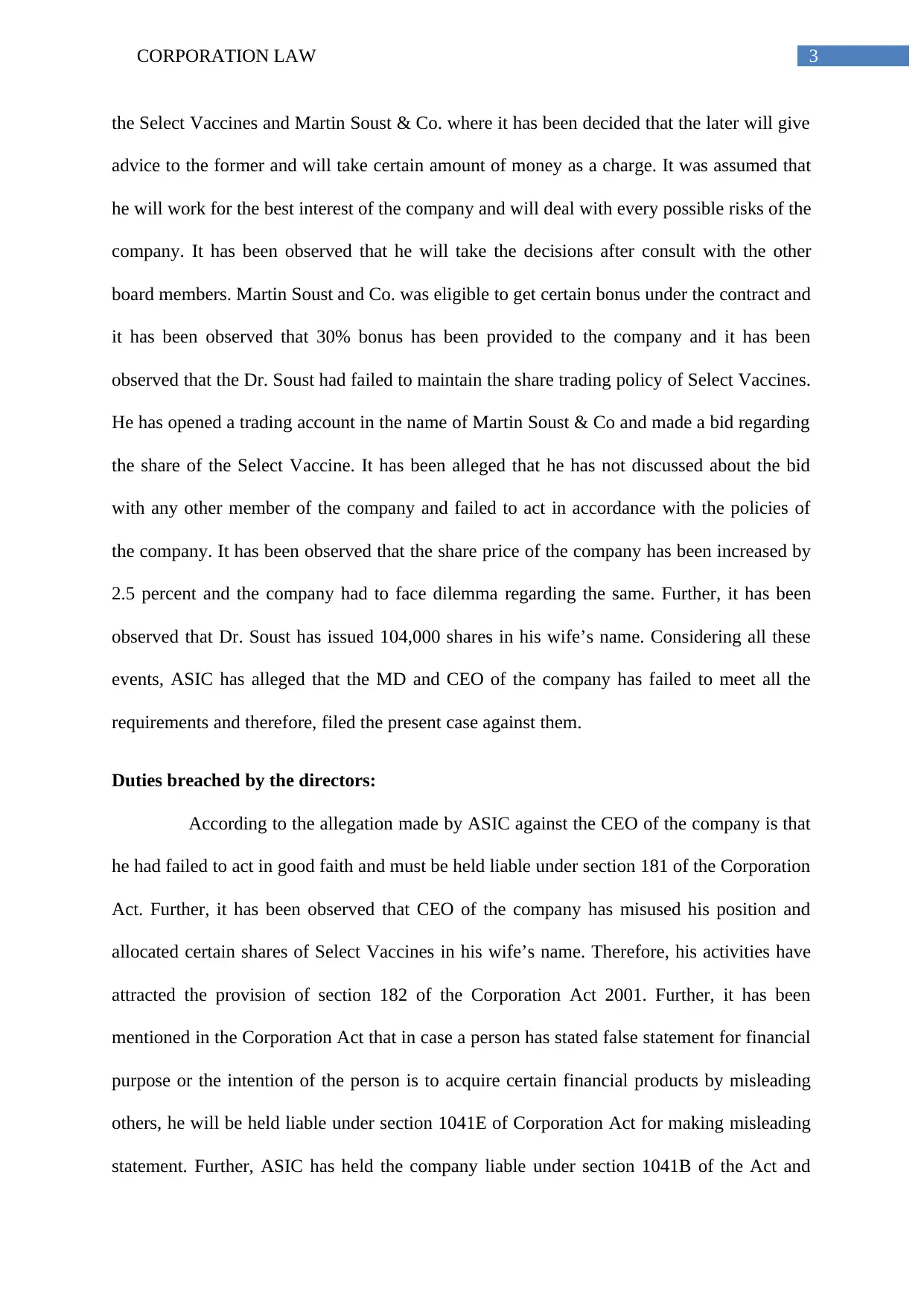
3CORPORATION LAW
the Select Vaccines and Martin Soust & Co. where it has been decided that the later will give
advice to the former and will take certain amount of money as a charge. It was assumed that
he will work for the best interest of the company and will deal with every possible risks of the
company. It has been observed that he will take the decisions after consult with the other
board members. Martin Soust and Co. was eligible to get certain bonus under the contract and
it has been observed that 30% bonus has been provided to the company and it has been
observed that the Dr. Soust had failed to maintain the share trading policy of Select Vaccines.
He has opened a trading account in the name of Martin Soust & Co and made a bid regarding
the share of the Select Vaccine. It has been alleged that he has not discussed about the bid
with any other member of the company and failed to act in accordance with the policies of
the company. It has been observed that the share price of the company has been increased by
2.5 percent and the company had to face dilemma regarding the same. Further, it has been
observed that Dr. Soust has issued 104,000 shares in his wife’s name. Considering all these
events, ASIC has alleged that the MD and CEO of the company has failed to meet all the
requirements and therefore, filed the present case against them.
Duties breached by the directors:
According to the allegation made by ASIC against the CEO of the company is that
he had failed to act in good faith and must be held liable under section 181 of the Corporation
Act. Further, it has been observed that CEO of the company has misused his position and
allocated certain shares of Select Vaccines in his wife’s name. Therefore, his activities have
attracted the provision of section 182 of the Corporation Act 2001. Further, it has been
mentioned in the Corporation Act that in case a person has stated false statement for financial
purpose or the intention of the person is to acquire certain financial products by misleading
others, he will be held liable under section 1041E of Corporation Act for making misleading
statement. Further, ASIC has held the company liable under section 1041B of the Act and
the Select Vaccines and Martin Soust & Co. where it has been decided that the later will give
advice to the former and will take certain amount of money as a charge. It was assumed that
he will work for the best interest of the company and will deal with every possible risks of the
company. It has been observed that he will take the decisions after consult with the other
board members. Martin Soust and Co. was eligible to get certain bonus under the contract and
it has been observed that 30% bonus has been provided to the company and it has been
observed that the Dr. Soust had failed to maintain the share trading policy of Select Vaccines.
He has opened a trading account in the name of Martin Soust & Co and made a bid regarding
the share of the Select Vaccine. It has been alleged that he has not discussed about the bid
with any other member of the company and failed to act in accordance with the policies of
the company. It has been observed that the share price of the company has been increased by
2.5 percent and the company had to face dilemma regarding the same. Further, it has been
observed that Dr. Soust has issued 104,000 shares in his wife’s name. Considering all these
events, ASIC has alleged that the MD and CEO of the company has failed to meet all the
requirements and therefore, filed the present case against them.
Duties breached by the directors:
According to the allegation made by ASIC against the CEO of the company is that
he had failed to act in good faith and must be held liable under section 181 of the Corporation
Act. Further, it has been observed that CEO of the company has misused his position and
allocated certain shares of Select Vaccines in his wife’s name. Therefore, his activities have
attracted the provision of section 182 of the Corporation Act 2001. Further, it has been
mentioned in the Corporation Act that in case a person has stated false statement for financial
purpose or the intention of the person is to acquire certain financial products by misleading
others, he will be held liable under section 1041E of Corporation Act for making misleading
statement. Further, ASIC has held the company liable under section 1041B of the Act and
Paraphrase This Document
Need a fresh take? Get an instant paraphrase of this document with our AI Paraphraser
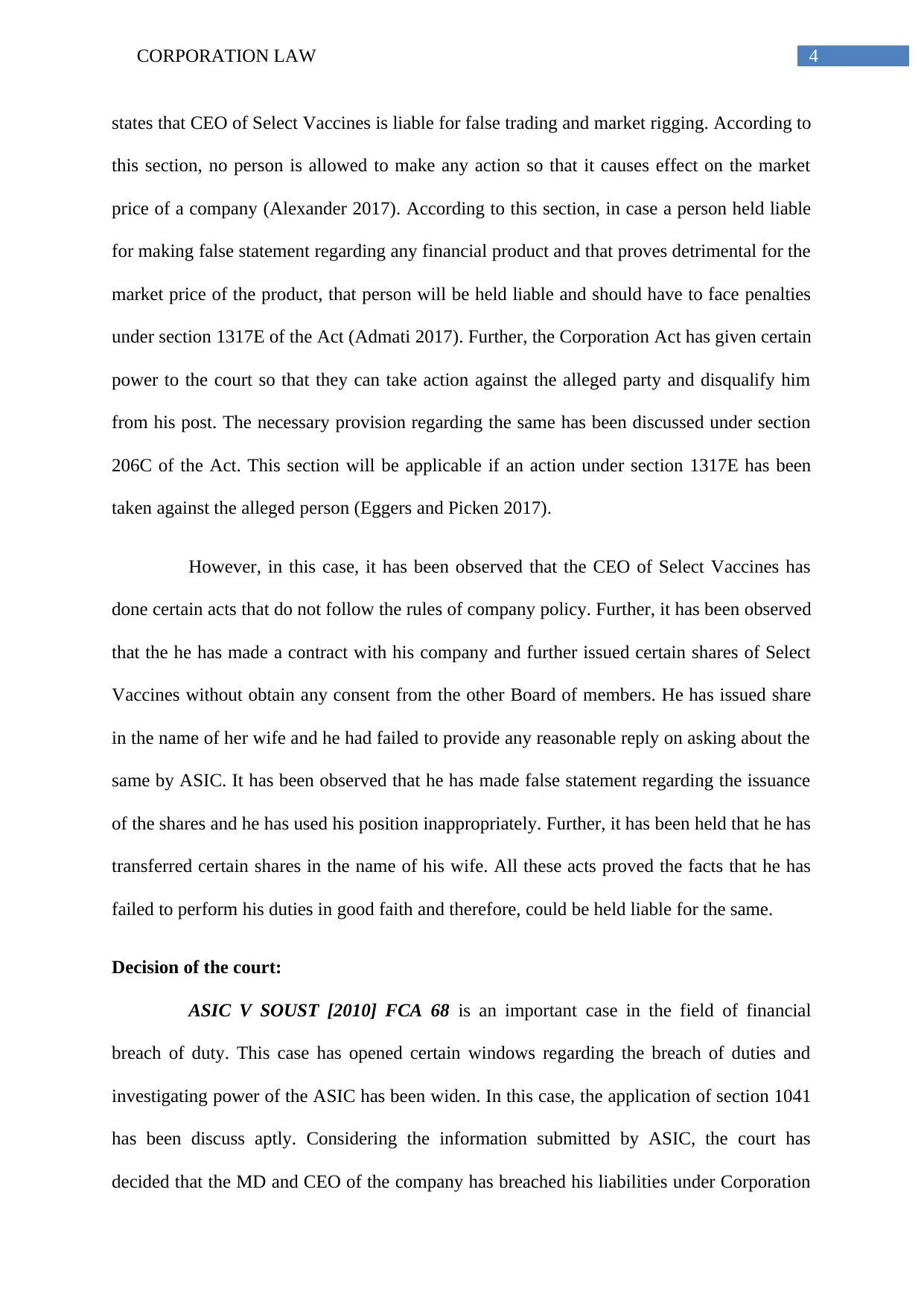
4CORPORATION LAW
states that CEO of Select Vaccines is liable for false trading and market rigging. According to
this section, no person is allowed to make any action so that it causes effect on the market
price of a company (Alexander 2017). According to this section, in case a person held liable
for making false statement regarding any financial product and that proves detrimental for the
market price of the product, that person will be held liable and should have to face penalties
under section 1317E of the Act (Admati 2017). Further, the Corporation Act has given certain
power to the court so that they can take action against the alleged party and disqualify him
from his post. The necessary provision regarding the same has been discussed under section
206C of the Act. This section will be applicable if an action under section 1317E has been
taken against the alleged person (Eggers and Picken 2017).
However, in this case, it has been observed that the CEO of Select Vaccines has
done certain acts that do not follow the rules of company policy. Further, it has been observed
that the he has made a contract with his company and further issued certain shares of Select
Vaccines without obtain any consent from the other Board of members. He has issued share
in the name of her wife and he had failed to provide any reasonable reply on asking about the
same by ASIC. It has been observed that he has made false statement regarding the issuance
of the shares and he has used his position inappropriately. Further, it has been held that he has
transferred certain shares in the name of his wife. All these acts proved the facts that he has
failed to perform his duties in good faith and therefore, could be held liable for the same.
Decision of the court:
ASIC V SOUST [2010] FCA 68 is an important case in the field of financial
breach of duty. This case has opened certain windows regarding the breach of duties and
investigating power of the ASIC has been widen. In this case, the application of section 1041
has been discuss aptly. Considering the information submitted by ASIC, the court has
decided that the MD and CEO of the company has breached his liabilities under Corporation
states that CEO of Select Vaccines is liable for false trading and market rigging. According to
this section, no person is allowed to make any action so that it causes effect on the market
price of a company (Alexander 2017). According to this section, in case a person held liable
for making false statement regarding any financial product and that proves detrimental for the
market price of the product, that person will be held liable and should have to face penalties
under section 1317E of the Act (Admati 2017). Further, the Corporation Act has given certain
power to the court so that they can take action against the alleged party and disqualify him
from his post. The necessary provision regarding the same has been discussed under section
206C of the Act. This section will be applicable if an action under section 1317E has been
taken against the alleged person (Eggers and Picken 2017).
However, in this case, it has been observed that the CEO of Select Vaccines has
done certain acts that do not follow the rules of company policy. Further, it has been observed
that the he has made a contract with his company and further issued certain shares of Select
Vaccines without obtain any consent from the other Board of members. He has issued share
in the name of her wife and he had failed to provide any reasonable reply on asking about the
same by ASIC. It has been observed that he has made false statement regarding the issuance
of the shares and he has used his position inappropriately. Further, it has been held that he has
transferred certain shares in the name of his wife. All these acts proved the facts that he has
failed to perform his duties in good faith and therefore, could be held liable for the same.
Decision of the court:
ASIC V SOUST [2010] FCA 68 is an important case in the field of financial
breach of duty. This case has opened certain windows regarding the breach of duties and
investigating power of the ASIC has been widen. In this case, the application of section 1041
has been discuss aptly. Considering the information submitted by ASIC, the court has
decided that the MD and CEO of the company has breached his liabilities under Corporation
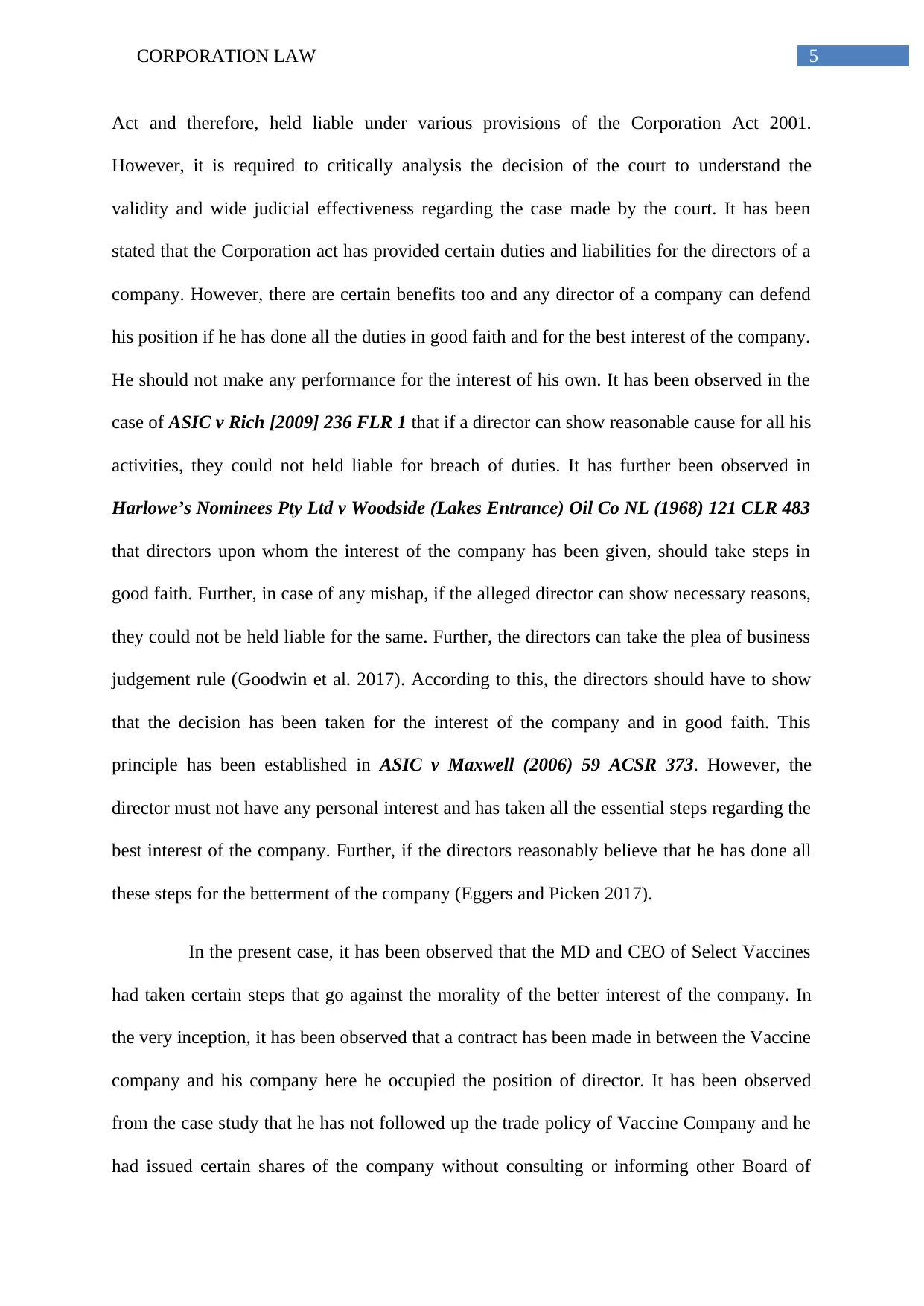
5CORPORATION LAW
Act and therefore, held liable under various provisions of the Corporation Act 2001.
However, it is required to critically analysis the decision of the court to understand the
validity and wide judicial effectiveness regarding the case made by the court. It has been
stated that the Corporation act has provided certain duties and liabilities for the directors of a
company. However, there are certain benefits too and any director of a company can defend
his position if he has done all the duties in good faith and for the best interest of the company.
He should not make any performance for the interest of his own. It has been observed in the
case of ASIC v Rich [2009] 236 FLR 1 that if a director can show reasonable cause for all his
activities, they could not held liable for breach of duties. It has further been observed in
Harlowe’s Nominees Pty Ltd v Woodside (Lakes Entrance) Oil Co NL (1968) 121 CLR 483
that directors upon whom the interest of the company has been given, should take steps in
good faith. Further, in case of any mishap, if the alleged director can show necessary reasons,
they could not be held liable for the same. Further, the directors can take the plea of business
judgement rule (Goodwin et al. 2017). According to this, the directors should have to show
that the decision has been taken for the interest of the company and in good faith. This
principle has been established in ASIC v Maxwell (2006) 59 ACSR 373. However, the
director must not have any personal interest and has taken all the essential steps regarding the
best interest of the company. Further, if the directors reasonably believe that he has done all
these steps for the betterment of the company (Eggers and Picken 2017).
In the present case, it has been observed that the MD and CEO of Select Vaccines
had taken certain steps that go against the morality of the better interest of the company. In
the very inception, it has been observed that a contract has been made in between the Vaccine
company and his company here he occupied the position of director. It has been observed
from the case study that he has not followed up the trade policy of Vaccine Company and he
had issued certain shares of the company without consulting or informing other Board of
Act and therefore, held liable under various provisions of the Corporation Act 2001.
However, it is required to critically analysis the decision of the court to understand the
validity and wide judicial effectiveness regarding the case made by the court. It has been
stated that the Corporation act has provided certain duties and liabilities for the directors of a
company. However, there are certain benefits too and any director of a company can defend
his position if he has done all the duties in good faith and for the best interest of the company.
He should not make any performance for the interest of his own. It has been observed in the
case of ASIC v Rich [2009] 236 FLR 1 that if a director can show reasonable cause for all his
activities, they could not held liable for breach of duties. It has further been observed in
Harlowe’s Nominees Pty Ltd v Woodside (Lakes Entrance) Oil Co NL (1968) 121 CLR 483
that directors upon whom the interest of the company has been given, should take steps in
good faith. Further, in case of any mishap, if the alleged director can show necessary reasons,
they could not be held liable for the same. Further, the directors can take the plea of business
judgement rule (Goodwin et al. 2017). According to this, the directors should have to show
that the decision has been taken for the interest of the company and in good faith. This
principle has been established in ASIC v Maxwell (2006) 59 ACSR 373. However, the
director must not have any personal interest and has taken all the essential steps regarding the
best interest of the company. Further, if the directors reasonably believe that he has done all
these steps for the betterment of the company (Eggers and Picken 2017).
In the present case, it has been observed that the MD and CEO of Select Vaccines
had taken certain steps that go against the morality of the better interest of the company. In
the very inception, it has been observed that a contract has been made in between the Vaccine
company and his company here he occupied the position of director. It has been observed
from the case study that he has not followed up the trade policy of Vaccine Company and he
had issued certain shares of the company without consulting or informing other Board of
⊘ This is a preview!⊘
Do you want full access?
Subscribe today to unlock all pages.

Trusted by 1+ million students worldwide
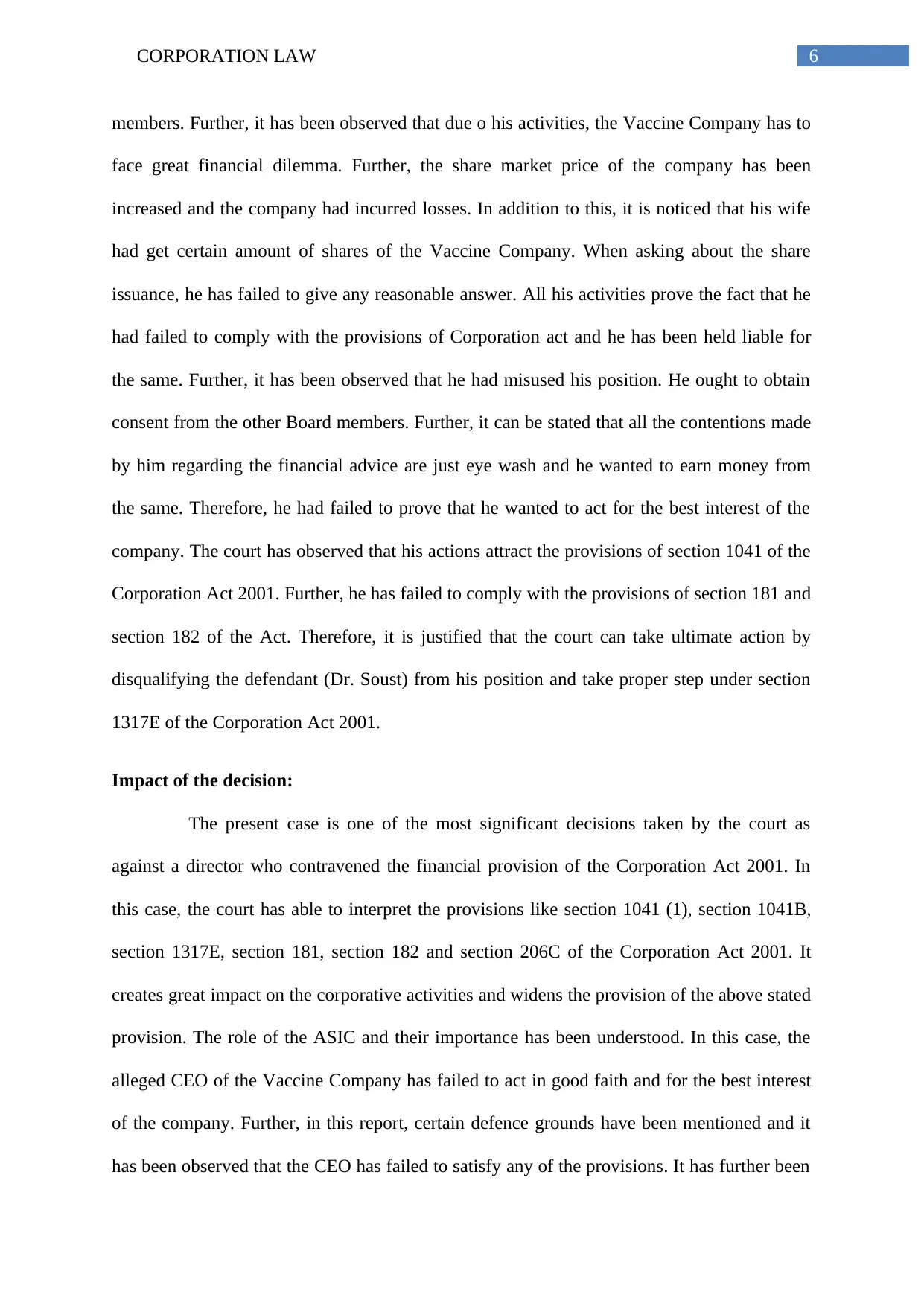
6CORPORATION LAW
members. Further, it has been observed that due o his activities, the Vaccine Company has to
face great financial dilemma. Further, the share market price of the company has been
increased and the company had incurred losses. In addition to this, it is noticed that his wife
had get certain amount of shares of the Vaccine Company. When asking about the share
issuance, he has failed to give any reasonable answer. All his activities prove the fact that he
had failed to comply with the provisions of Corporation act and he has been held liable for
the same. Further, it has been observed that he had misused his position. He ought to obtain
consent from the other Board members. Further, it can be stated that all the contentions made
by him regarding the financial advice are just eye wash and he wanted to earn money from
the same. Therefore, he had failed to prove that he wanted to act for the best interest of the
company. The court has observed that his actions attract the provisions of section 1041 of the
Corporation Act 2001. Further, he has failed to comply with the provisions of section 181 and
section 182 of the Act. Therefore, it is justified that the court can take ultimate action by
disqualifying the defendant (Dr. Soust) from his position and take proper step under section
1317E of the Corporation Act 2001.
Impact of the decision:
The present case is one of the most significant decisions taken by the court as
against a director who contravened the financial provision of the Corporation Act 2001. In
this case, the court has able to interpret the provisions like section 1041 (1), section 1041B,
section 1317E, section 181, section 182 and section 206C of the Corporation Act 2001. It
creates great impact on the corporative activities and widens the provision of the above stated
provision. The role of the ASIC and their importance has been understood. In this case, the
alleged CEO of the Vaccine Company has failed to act in good faith and for the best interest
of the company. Further, in this report, certain defence grounds have been mentioned and it
has been observed that the CEO has failed to satisfy any of the provisions. It has further been
members. Further, it has been observed that due o his activities, the Vaccine Company has to
face great financial dilemma. Further, the share market price of the company has been
increased and the company had incurred losses. In addition to this, it is noticed that his wife
had get certain amount of shares of the Vaccine Company. When asking about the share
issuance, he has failed to give any reasonable answer. All his activities prove the fact that he
had failed to comply with the provisions of Corporation act and he has been held liable for
the same. Further, it has been observed that he had misused his position. He ought to obtain
consent from the other Board members. Further, it can be stated that all the contentions made
by him regarding the financial advice are just eye wash and he wanted to earn money from
the same. Therefore, he had failed to prove that he wanted to act for the best interest of the
company. The court has observed that his actions attract the provisions of section 1041 of the
Corporation Act 2001. Further, he has failed to comply with the provisions of section 181 and
section 182 of the Act. Therefore, it is justified that the court can take ultimate action by
disqualifying the defendant (Dr. Soust) from his position and take proper step under section
1317E of the Corporation Act 2001.
Impact of the decision:
The present case is one of the most significant decisions taken by the court as
against a director who contravened the financial provision of the Corporation Act 2001. In
this case, the court has able to interpret the provisions like section 1041 (1), section 1041B,
section 1317E, section 181, section 182 and section 206C of the Corporation Act 2001. It
creates great impact on the corporative activities and widens the provision of the above stated
provision. The role of the ASIC and their importance has been understood. In this case, the
alleged CEO of the Vaccine Company has failed to act in good faith and for the best interest
of the company. Further, in this report, certain defence grounds have been mentioned and it
has been observed that the CEO has failed to satisfy any of the provisions. It has further been
Paraphrase This Document
Need a fresh take? Get an instant paraphrase of this document with our AI Paraphraser
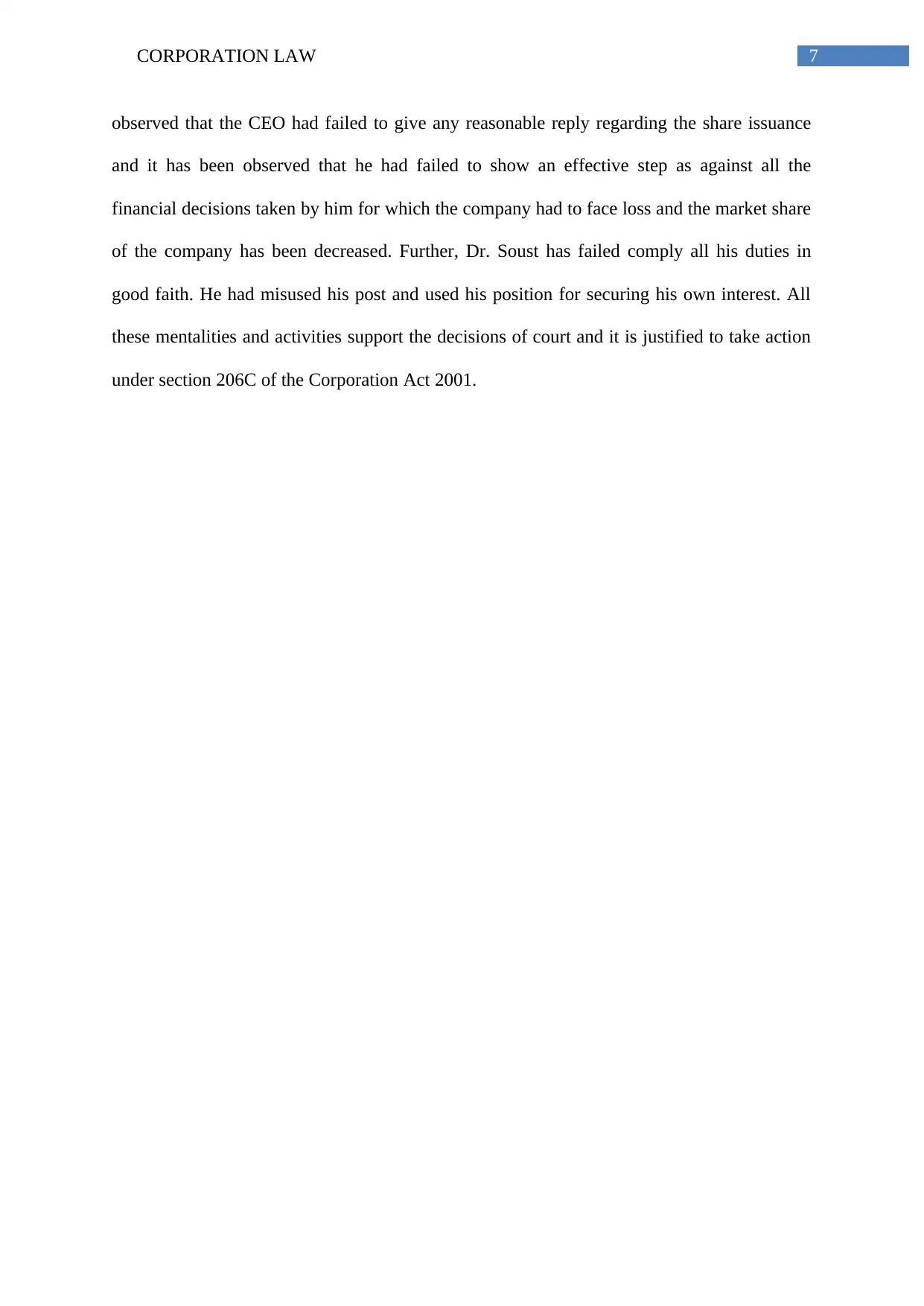
7CORPORATION LAW
observed that the CEO had failed to give any reasonable reply regarding the share issuance
and it has been observed that he had failed to show an effective step as against all the
financial decisions taken by him for which the company had to face loss and the market share
of the company has been decreased. Further, Dr. Soust has failed comply all his duties in
good faith. He had misused his post and used his position for securing his own interest. All
these mentalities and activities support the decisions of court and it is justified to take action
under section 206C of the Corporation Act 2001.
observed that the CEO had failed to give any reasonable reply regarding the share issuance
and it has been observed that he had failed to show an effective step as against all the
financial decisions taken by him for which the company had to face loss and the market share
of the company has been decreased. Further, Dr. Soust has failed comply all his duties in
good faith. He had misused his post and used his position for securing his own interest. All
these mentalities and activities support the decisions of court and it is justified to take action
under section 206C of the Corporation Act 2001.
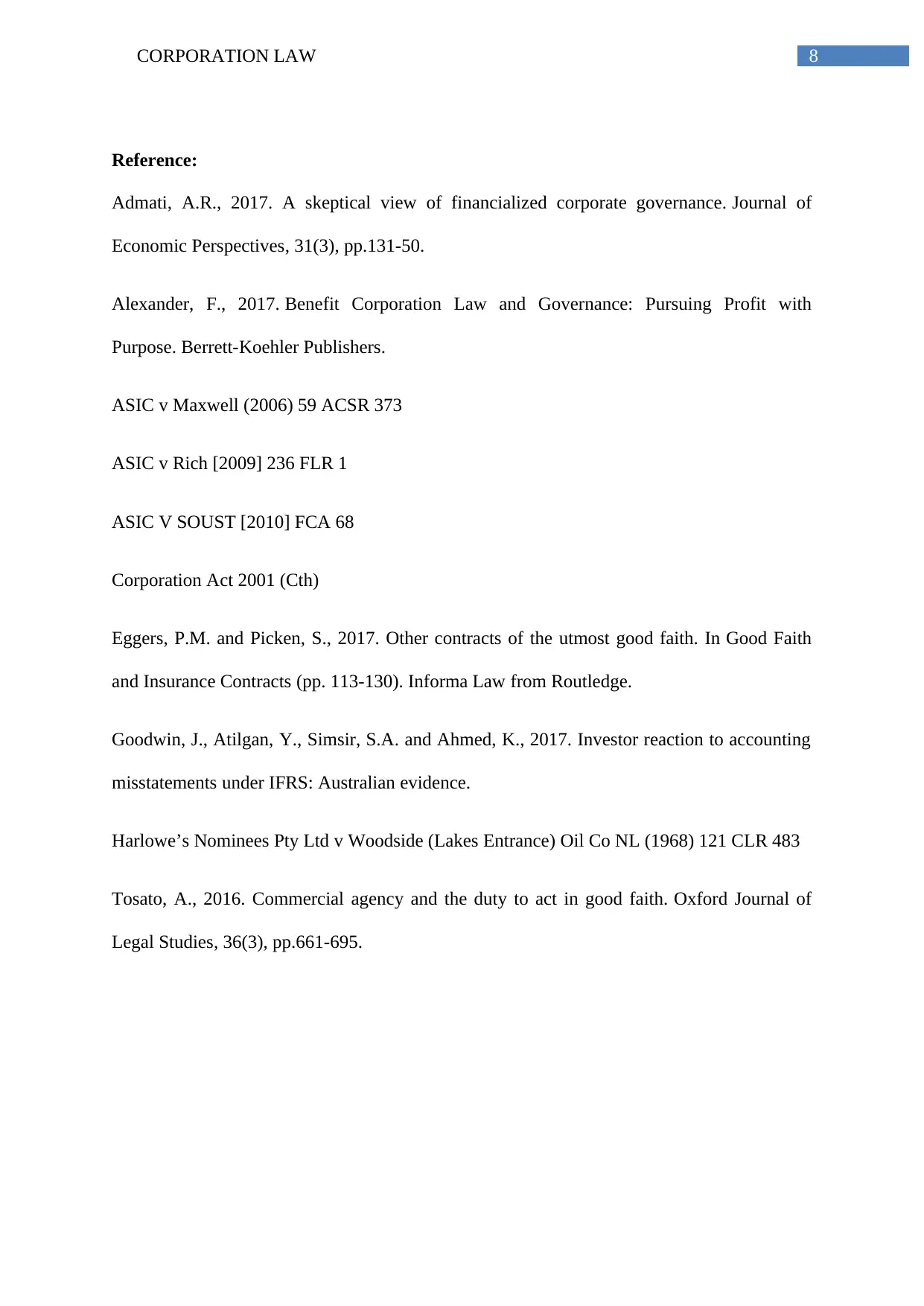
8CORPORATION LAW
Reference:
Admati, A.R., 2017. A skeptical view of financialized corporate governance. Journal of
Economic Perspectives, 31(3), pp.131-50.
Alexander, F., 2017. Benefit Corporation Law and Governance: Pursuing Profit with
Purpose. Berrett-Koehler Publishers.
ASIC v Maxwell (2006) 59 ACSR 373
ASIC v Rich [2009] 236 FLR 1
ASIC V SOUST [2010] FCA 68
Corporation Act 2001 (Cth)
Eggers, P.M. and Picken, S., 2017. Other contracts of the utmost good faith. In Good Faith
and Insurance Contracts (pp. 113-130). Informa Law from Routledge.
Goodwin, J., Atilgan, Y., Simsir, S.A. and Ahmed, K., 2017. Investor reaction to accounting
misstatements under IFRS: Australian evidence.
Harlowe’s Nominees Pty Ltd v Woodside (Lakes Entrance) Oil Co NL (1968) 121 CLR 483
Tosato, A., 2016. Commercial agency and the duty to act in good faith. Oxford Journal of
Legal Studies, 36(3), pp.661-695.
Reference:
Admati, A.R., 2017. A skeptical view of financialized corporate governance. Journal of
Economic Perspectives, 31(3), pp.131-50.
Alexander, F., 2017. Benefit Corporation Law and Governance: Pursuing Profit with
Purpose. Berrett-Koehler Publishers.
ASIC v Maxwell (2006) 59 ACSR 373
ASIC v Rich [2009] 236 FLR 1
ASIC V SOUST [2010] FCA 68
Corporation Act 2001 (Cth)
Eggers, P.M. and Picken, S., 2017. Other contracts of the utmost good faith. In Good Faith
and Insurance Contracts (pp. 113-130). Informa Law from Routledge.
Goodwin, J., Atilgan, Y., Simsir, S.A. and Ahmed, K., 2017. Investor reaction to accounting
misstatements under IFRS: Australian evidence.
Harlowe’s Nominees Pty Ltd v Woodside (Lakes Entrance) Oil Co NL (1968) 121 CLR 483
Tosato, A., 2016. Commercial agency and the duty to act in good faith. Oxford Journal of
Legal Studies, 36(3), pp.661-695.
⊘ This is a preview!⊘
Do you want full access?
Subscribe today to unlock all pages.

Trusted by 1+ million students worldwide
1 out of 9
Related Documents
Your All-in-One AI-Powered Toolkit for Academic Success.
+13062052269
info@desklib.com
Available 24*7 on WhatsApp / Email
![[object Object]](/_next/static/media/star-bottom.7253800d.svg)
Unlock your academic potential
Copyright © 2020–2026 A2Z Services. All Rights Reserved. Developed and managed by ZUCOL.





